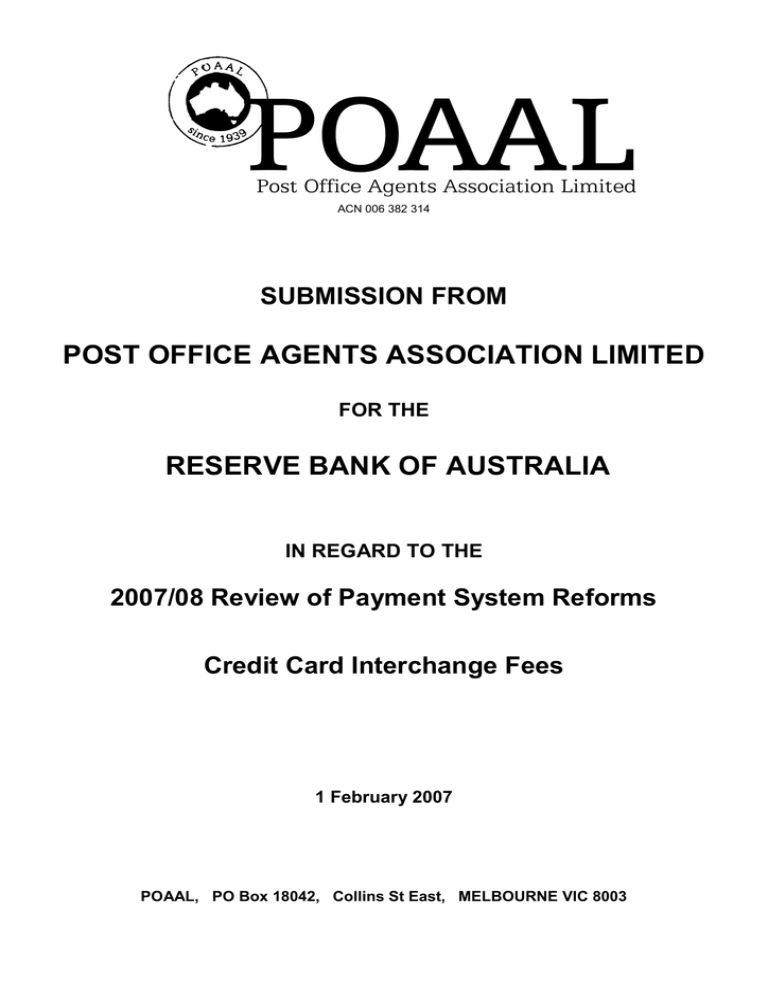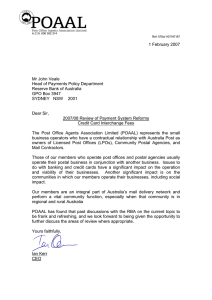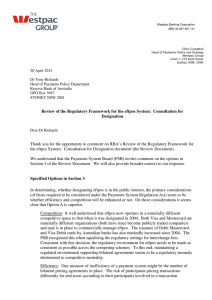POST OFFICE AGENTS ASSOCIATION LIMITED RESERVE BANK OF AUSTRALIA SUBMISSION FROM
advertisement

ACN 006 382 314 ACN 006 382 314 SUBMISSION FROM POST OFFICE AGENTS ASSOCIATION LIMITED FOR THE RESERVE BANK OF AUSTRALIA IN REGARD TO THE 2007/08 Review of Payment System Reforms Credit Card Interchange Fees 1 February 2007 POAAL, PO Box 18042, Collins St East, MELBOURNE VIC 8003 1 POAAL Profile POAAL represents the nearly 3,000 small business owners of the Licensed Post Office network that comprise 80% of the Australia Post retail network. Our members are also drawn from the 6,000 mail contractors who deliver mail and parcels to Australia Post customers across the country together with around 600 Community Postal/Mail Agents. (Further information on the background of our organisation may be found at the attachment to this submission or on our web-site www.poaal.com.au.) Our members are all small business owner/operators who in total have invested an estimated $800 million in the Postal business. They are the front line for the services provided to Australian communities especially in regional, rural and remote areas of Australia. In contrast they work for one of the largest and most powerful organisations in Australia. Australia Post is regularly ranked as one of the top ten employers and amongst the top six financial performers in the country. It has a huge management infrastructure with powerful resources at its disposal to ensure that its interests are protected and its position within the business community sustained. As such, POAAL has a high level of interest on behalf of its members in the effectiveness and cost to its members of the credit card and debit card systems, as well as banking practices, as they relate to the protection of these small business operators and their communities. 2 INTRODUCTION All Australians are affected by the EFTPOS and Credit Card systems currently operating in Australia. Such effects are both advantageous but at times also disadvantageous. Cost structures for these two systems have been under review for a number of years and POAAL has provided a number of submissions that have provided comment from a social, economic and small business perspective to almost all of the inquiries. We see the need for a system that whilst being robust and flexible meets the social, economic, political and infrastructure requirements of the Australian economy as a whole. Additionally, POAAL sees a need to further review the role of the RBA and the need to increase its powers should it be in the best interests of the Australian Community. ACCESS One of the most important points is to consider the access to the system. There are a number of issues within this area, all of which are fundamental to ensuring the system remains as efficient as possible. Access to Existing Members – this encompasses the original credit card stakeholders (eg Visa [both debit and credit] and MasterCard), major banking institutions who are part of the credit card system and the members of the EFTPOS users group (the original group who set up the EFTPOS system which comprises the major trading banks and a number of the larger retailers in the Australian Retail System). The review needs to ensure that these members are able to continue in an adequate regulatory framework that allows for two primary functions: • Providing a clear regulatory framework that meets the needs of the providing party (or parties if the interchange provider is different to the service provider) to the transaction. The provider must be able to clearly understand their rights and obligations; and • Ensuring that the consuming party is being provided with a service that is cost effective and meets the needs of the parties to 3 the transaction. Consumer parties would include interchange correspondent parties, retail consumers and retail providers (retailers). Additionally, the regulatory framework needs to be clear, concise and non-ambiguous so that the consuming party is aware of the potential for cost and recourse if needed. Access to Potential Service Providers – The regulatory framework needs to have sufficient flexibility to allow new members the right to enter the system and after making the appropriate capital contribution are able to avail themselves of the cash flows from the interchange systems and credit card systems. Access to Retailers – Retailers need to be able to continue to access a system on a fair and equitable basis. Most retailers are small business parties and as such do not have the market position to enable them to bargain with service providers to ensure that they are able to remain competitive. A recent ring around to other small business operators by one of our members in a small town in NSW elicited that the costs to offer EFTPOS to customers were as follows: • Each transaction costs between $0.55 and $1.20 per transaction; • Minimum base fee of $25 per month; and • The retailer incurs a telephone call charge for each transaction. This has resulted in many small businesses being forced to charge for this service if the total of the goods and services purchased falls below certain minimum profit margin levels. Additionally, cash out is not always offered and in some cases an additional fee is levied for a cash out only transaction. Access for Consumers – There is little question that the advent of the credit and debit card economy has allowed the Australian economy as a whole to grow. Advantages have accrued to consumers who are able to use these instruments to purchase goods and services that a cash only economy may not have been able to support. Also, security has improved from the consumers’ point of view as there is now not the strong need to carry cash. 4 Additionally, credit card lines of credit have allowed many households to attain a higher standard of living and when used in a responsible manner allow these gains to be funded efficiently. Conversely, some disadvantages have emerged which include: • Credit Card debt has grown substantially leaving some consumers in precarious financial positions; • Impulse spending has increased with the use of “plastic” with social issues emerging because of this; • Greater reliance on “non cash” transactions forcing consumers to pay for the right to access salary and wages following the almost monopolistic method of “direct credit”; • Technology reliability is still a major issue. In many instances when a small business “loses” its EFTPOS function due a technology failure, sales plummet as consumers are forced to go elsewhere to satisfy demand; • Excessive charges being levied on consumers by banks for allowing cash withdrawals (a charge of up to $3 at one bank); and • If a consumer loses their debit card they can be “stranded” until the issuing bank can issue and deliver a new card. Whilst some of the above can at best be described as “systemic” problems and we question the role of the RBA in regulating these issues, they serve to highlight the need to remain vigilant to emergent social issues. Another issue that is common to regional areas of Australia is the lack of cash availability. The withdrawal of banking services in general and the introduction of high cost non-branded ATM sites has forced consumers in small towns and villages to adopt the use of the EFTPOS system. Consequently the banks have been in a win-win position by withdrawing the availability of cash and reaping the income from EFTPOS transactions. Consumers in general find that banks now focus on their shareholders rather than customers as a whole. 5 INTERCHANGE FEES Interchange fees have been an ongoing issue from the perspective of major banks and the RBA for some time now. Essentially, proposals have included reduction of the fee to zero and full regulation of the fee by RBA. From discussions with members of the EFTPOS Working Group we have been informed that every time a transaction occurs between two members of the group, an interchange fee is payable. However whilst one party may incur the fee they also receive a benefit from the fee in the form of an additional fee from the group. Thus, the members of the group have the incentive to continue to be members of the group. Additionally, the members who are retailers have the added benefit of reducing their EFTPOS transaction cost due to the positive cash flow of income. An argument has been posed that the reduction of fees to a zero interchange fee will encourage more entrants to the market place given that such a reduction will mean the end to the current bipartisan arrangements between each individual member (these agreements apparently effectively locked out new entrants). It is our belief that this, whilst opening the system for new entrants on the basis that there are no entry costs to be incurred, would provide little or no incentive for existing and new players to either enter or continue in the market due to the lack of income. Additionally, new entrants would need to circumvent current merchant arrangements and try to attract new merchants on the basis of fees only. The new entrant would also need to find an interchange partner who may then be in the position to hold the new entrant “to ransom” and withhold access until the “correct” fee is paid. We see the ongoing issue here will be one of power to control the fee income of members and as such the need to have some form of authority to ensure equality is struck between all parties to the EFTPOS transaction (such parties including the retailer and consumer to the underlying transaction). 6 CONTROL Much of the original regulatory authority over the banks as a whole was reduced in the 1980s following deregulation under the Hawke/Keating governments. Since then the face of banking has changed dramatically. Prudential authority has remained with the RBA however the issue of fees, charges and interest rates has been left to a form of selfregulation by the players in the market as a whole. With the current retail banking economy being influenced by a small number of players (some of whom have the ability to hold immeasurable power) the depth of the market for consumers and small business to “bargain” is somewhat restricted. This is clearly seen in the fees for EFTPOS and Credit Cards. Politically, there appears to be little apparent control. Announcements are made and Inquiries undertaken but to the end user groups little change is seen to happen. POAAL supports the introduction of increased regulation that will ensure the needs of the community are met and that no one socioeconomic or geographical community is disadvantaged. Essentially, a balanced approach needs to be adopted where all members of the community contribute to the general benefit of the community as a whole. ECONOMICS The Australian economy is continuing to perform within acceptable boundaries as outlined by the Federal Government and RBA continual information packages. Additionally, the RBA is the major instrument in determining Australia’s financial health via interest rate regulation. However, POAAL has the concern that the introduction of additional fees and/or fee structures in the EFTPOS and Credit Card markets will force consumers and retailers to review their use of such methods of payment. Such changes have the ability to directly impact on the Australian economy. Regional Australia is a fairly fragile economy and does not enjoy the flexibility and stability of the major cities in Australia. 7 Whilst government as a whole likes to encourage the repopulation of regional Australia, such proposals are dependent on infrastructure - physical, financial and social - being maintained. As noted earlier, the withdrawal of banking services in general and the introduction of high-cost non-branded ATM sites have forced consumers in small towns and villages to adopt the use of the EFTPOS system. Thus the banks have been in a win-win position by withdrawing the availability of cash (and reducing an ever increasing cost) and reaping the income from increased EFTPOS transactions. Businesses, especially small businesses, are forced to adopt the EFTPOS system for economic survival. This in itself brings with it increased costs, as outlined. In some instances businesses have been forced to add a nominal fee on top of the sale price of their products/services. In order to stay in business, small businesses have to price their wares competitively in order to survive. Today’s modern age allows the consumer to use the internet or to travel easily to major centres to avail themselves of large chain stores at, typically, finer pricing. Thus the further withdrawal of cash availability coupled with the encouragement to use EFTPOS will have far reaching impacts on small business. Small business is a major employer and driver within the Australian economy and we foresee that the introduction of further fees may place unreasonable demands on small business. We see the need for a well balanced and socially aligned perspective when reviewing the system as a whole. SOCIAL IMPACT Changing the current EFTPOS fee structure by removing fees charged to consumers and passing these fees onto business has a number of social impacts that we believe need considering. As noted earlier, the social impact of a changed fee structure has far-reaching consequences. The initial impact will be on the members of the community who fall within the lower socio-economic groups. This group is often not 8 equipped intellectually to deal with the challenges they would face with the reduction of bill paying opportunities. In order to deal with these challenges they could be at the mercy of the more aggressive members of the business community and exploitation could occur. Licensed Post Offices and their associated businesses will also be affected. The consequences will result in a loss of jobs for employees as Licensees are faced with reduced business and reduced income. In order to maintain their standard of living they will need to reduce costs. Consequently, staffing will be one of the first areas to be reduced. As the majority of Licensees conduct postal operations in small rural communities the loss of employment opportunities has a number of implications for these small communities. Reductions in the availability of cash will also impact communities. This will mostly affect smaller rural communities. These communities battle on a daily basis to survive at the best of times. They do not need to face additional strains. CONCLUSION POAAL believes that this wide ranging review needs to encompass the full implications that changes to the existing system may entail. The current system, whilst not perfect by any means may be preferable to a system of purely “user pays”. Postal Licensees are small business operators and in a large number of instances operate another business in conjunction with their LPO. These people are integral to small communities, be it suburbia or small country townships. The need for a sense of community has been widely encouraged by all levels of government recently and POAAL believes that the RBA needs to consider such obligations as part of its review. POAAL welcomes the initiative of the RBA in commissioning this review and encourages the review to include the social impact effects that often follow from “big business” decisions. 9 Attachment Background on the Post Office Agents Association Limited The Post Office Agents Association Limited (POAAL) is the industry organisation that has a strong and long term commitment to look after the business interests of the owner/operators of Licensed Post Offices, Community Postal Agents (CPAs) Community Mail Agents (CMAs) and Australia Post Mail Contractors. There are almost 3000 Licensed Post Offices (LPOs) in Australia, and they form almost 80% of the retail post office network. Each is privately owned and over half of them are situated in country areas. There are about 600 CPAs and 135 CMAs in Australia, usually in sparsely-populated areas. POAAL was formed over 60 years ago, when owner/operators of post offices recognised that they needed the protection, support and collective strength of an association to effectively look after their needs, especially those who operate small or remotely located post offices. POAAL has six State Branches, each with a State Chairman and Committee. Committee members come from all parts of each State, and work in a voluntary capacity, bringing experience, dedication and loyalty to their work of assisting their colleagues. Branch and Area meetings are held in all parts of the country, and give Licensees and Mail Contractors the opportunity to meet, share experiences and gain information to assist in operating their business. Most LPOs are operated in conjunction with another business: eg newsagency, general store, and all sell at least some products other than postal. Licensees do not receive a salary. They are paid by way of fees, commissions and discounts according to the volume of work performed. Licensees pay their own business costs (eg utilities, staff, rent, insurance, telephone, cleaning, maintenance). 10 A Short History of the POAAL Organisation The Post Office Agents Association Limited (POAAL) started life as the Non-Official Postmasters Association in 1939. It was formed by a group of Non-Official Postmasters (ie owner/operators of nonCorporate PMG post offices) who banded together to share information, to negotiate and talk with the PMG, and to improve the lot of themselves and their colleagues. Non-Official Postmasters and Postmistresses not only operated post offices, but a large percentage of them operated as Telephone Office-Keepers - that is, they operated a manual telephone exchange and were expected to be on call 24 hours a day, 7 days a week. By the time the PMG had split into Australia Post and Telecom in 1975, telephone exchanges in Australia were well on the way to becoming automatic. As a result, the number of Non-Official Postmasters and Postmistresses reduced dramatically as small post offices that were in existence mainly to supply telephone services became uneconomic to operate when automation arrived. This had a flow-on effect to local communities, many of which effectively died when they lost their local post office. The name of the owner/operators of non-official post offices was changed to Post Office Agents to reflect the changed circumstances, and the fact that they were now agents of the principal, Australia Post. The Non-Official Postmasters Association became the Post Office Agents Association Limited. ABBREVIATIONS POAAL Post Office Agents Association Limited LPO Licensed Post Office CPA Community Postal Agency CMA Community Mail Agency PMG Postmaster-General’s Department RBA Reserve Bank of Australia ATM Automatic Teller Machine


